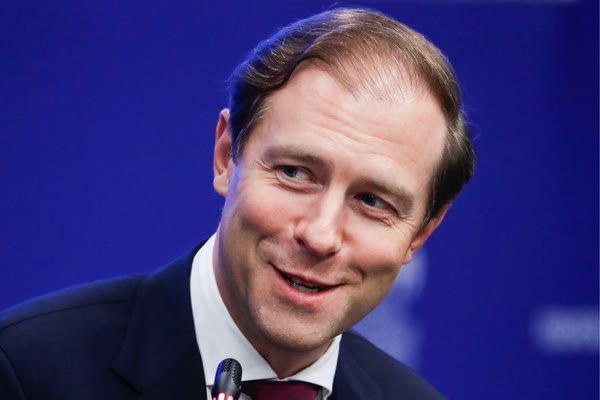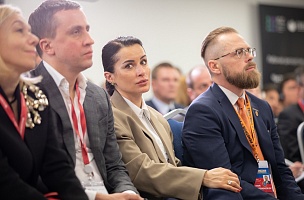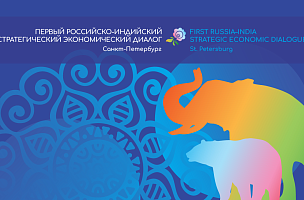KEY CONCLUSIONS
Reaching technological leadership requires complex approach
“A paramount task is to relate to every entrepreneur that new management systems [must be] implemented as a digital tool. When it comes to support tools, we have plenty. <…> Yet the large-scale process hasn’t started yet” Denis Manturov, Minister of Industry and Trade of the Russian Federation
“We’ve defined transformation as a multidimensional process that has 4 main facets. The first is operational efficiency. <…> Process unification that follows clear and evident criteria provides for an additional efficiency push. Second facet is digital transformation and data management. Third facet is cultural transformation: new cultural values, new leadership behavior models, when people come up with ideas, get involved, and motivate. Fourth facet is organization. Flexible teams, altered processes, project approach, creating new ecosystem, where the number of partners, both internal and external, is dozen times more than ten years ago,” Kirill Kravchenko, Member of the Management Board and Deputy Cheif Executive Officer, Gazprom Neft
The world is on the brink of technological revolution
“Industrial leaders of the past have transitioned from the state where they pilot singular projects and initiatives into the state where they scale these technologies. They don’t just scale the implementation but the management system itself: this allows the companies make them work on a far greater range. We’ve identified three main technological blocks: network integration that allows an organization to connect its equipment, people, and processes through a data exchange system; AI technologies; and flexible automation technologies. These technologies initiated a breakthrough we now call an industrial revolution. The industrial revolutions of the past have transformed industries before, and we think we’re witnessing a similar process. We’re in the beginning of this journey,” Avetik Chalabyan, Senior Partner, McKinsey & Company
PROBLEMS
Lack of ready-made solutions
“Everyone is used to working with ready-made solutions. <…> Pretty much everything we’re talking about now is something that doesn’t exist in a box. Instead, there is an idea that needs to be applied to a process, fine-tuned, and launched to work,” Dmitry Konov, Chairman of the Management Board, SIBUR Holding
The need to change customary decision-making schemes
“Any digital transformation needs rapid decision-making on “In digital transformation [we need] fast decision making during interim stages. <…> Waiting for a project to end when the condition around change so fast is plain impossible. How can fairly large companies, that in general tend to avoid risks – how can they reprogramme to make certain decision with tolerance for error?” Dmitry Konov, Chairman of the Management Board, SIBUR Holding
“Organizations need their own culture of change, need project offices, need implementation culture for those changes, and for many organizations it’s not easy. Carriers of change are needed, or, in other words, change management is required,” Mikhail Zadornov, President – Chairman of the Management Board, Otkritie FC Bank
High risks associated with new technological investments
“How can companies accustomed to efficient spending can work up tolerance to spending funds on something that doesn’t guarantee a certain return? How can organizations be tolerant towards paying for an unpredictable result? What is it we pay for, why are we paying for it and what is it going to do?” Dmitry Konov, Chairman of the Management Board, SIBUR Holding
SOLUTION
Rapid implementation of new technologies and change in management approach
“We need to use every opportunity Industry 4.0 provides [Industry 4.0 – an expected mass implementation of cyberphysics systems in production – Ed.] such as artificial intelligence, big data, and so on. But it’s important that the company changes its business processes,” Alexander Shevelyov, Chief Executive Officer, Severstal Management
“There are three components to our recipe: well thought through industrial modernization, usage of proven digital solutions, and above all, cultural transformation and human capital investment,” Alexey Ivanov, Senior Vice President for Commerce and Business Development, EVRAZ
“We’ve completely revised our strategy approach. Its every level now contains out mission, our values, our management philosophy,” Kirill Kravchenko, Member of the Management Board and Deputy Cheif Executive Officer, Gazprom Neft
“We’re planning self-driving trucks that will go around our borrow pits. It’s a unique project. <…> By and large, this is to make our personnel safer as they [trucks] work is grave conditions: inside mountains, mines, or chemical plants. <…> We see a great deal of efficiency there. Trucks can work despite any weather conditions, amid clouds of dust, there’s fuel efficiency improvement, and so on,” Andrey Guryev, Chief Executive Officer, Chairman of the Management Board, PhosAgro
Consecutive changes
“Smart production isn’t going to start until we link all the equipment together. This is the first step. The next step is the data it generates: this is where you can develop business analytics and use special tools. Step three: automation and robotization,” Rose Schooler, Corporate Vice President, Sales and Marketing Group, General Manager, Data Center Group, Intel Corporation
Continuous education for employees and management
“When we talk about the future, it’s people first. <…> I think the industry is moving towards its own continuous education. Top management education is imperative. <…> Companies that invest in people would come out on top,” Mikhail Zadornov, President – Chairman of the Management Board, Otkritie FC Bank
Sharing the experience
“Companies in any area should study best global practices,” Mikhail Zadornov, President – Chairman of the Management Board, Otkritie FC Bank
For more information, visit the Roscongress Foundation's Information and Analytical System at www.roscongress.org/en.






